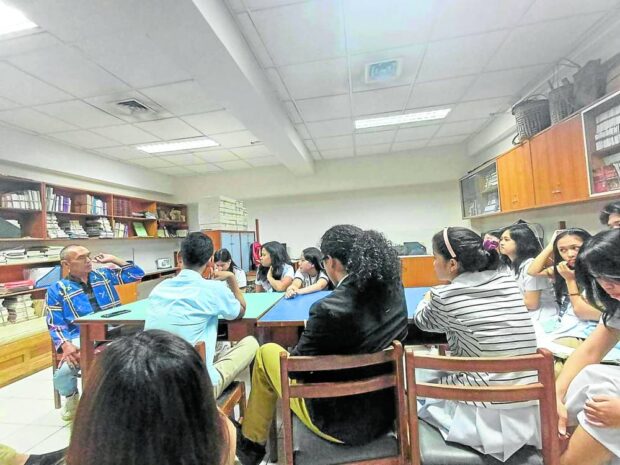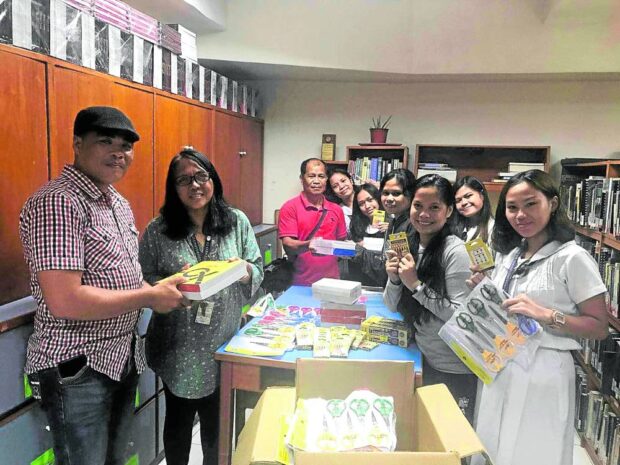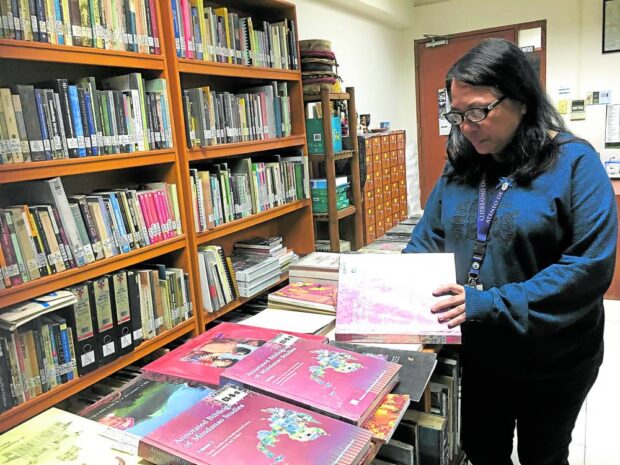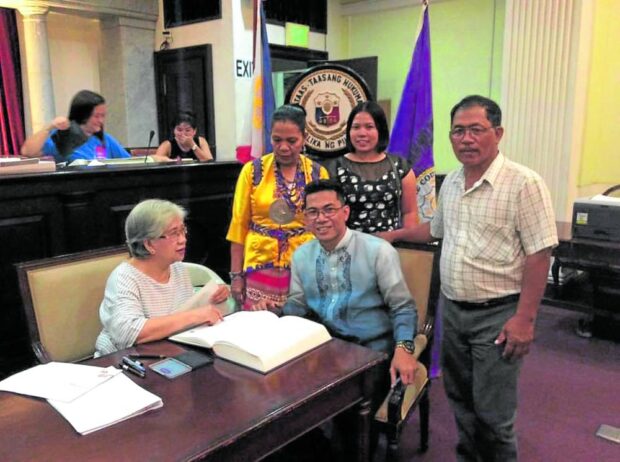Ateneo’s ‘lumad’ scholars stay true to their roots

CULTURAL ANCHOR “Lumad” scholars interact with Datu Rosalito Anog, Bagobo-Klata tribal chieftain in Barangay Sirib, Davao City, at the Ateneo de Davao University’s Finster Hall. The conversation is part of the cultural formation of the scholars so they honor and deepen their knowledge, love and respect for their roots and that of other indigenous peoples. —PHOTO COURTESY OF MINDANAWON
DAVAO CITY—Among a small crop of students at the Ateneo de Davao University’s (AdDU) aerospace program—a pioneering one in the country—is a “lumad,” thanks to an education initiative for indigenous peoples hatched in the 1990s.
In the last 22 years, the Mindanawon Initiatives for Cultural Dialogue, more known as Mindanawon, had produced 67 lumad professionals out of its scholarship program. Although most of the graduates are educators and social workers, the crop also includes a lawyer, a civil engineer, three chemical engineers and four nurses.
When in-person classes resumed this year following the long COVID-19 lockdown, Mindanawon accommodated 12 new scholars, and one of them, who first wanted to be a pilot, opted instead to enroll in the aerospace program.
Jesuit priest Fr. Albert Alejo, in a phone interview from Rome, could still picture how it all started back then. That time, he just completed his work among the Obo-Manobos on Mt. Apo, part of his dissertation for a doctorate program in social anthropology at the University of London’s School of Oriental and African Studies.
His work was later published into a book, “Generating Energies in Mt. Apo: Cultural Politics in a Contested Environment,” on the Obo-Manobos confronting the entry of a geothermal power plant in their ancestral land. In the course of his work, Alejo got acquainted with other people working with the lumad in Mindanao: Redemptorist Bro. Karl Gaspar, nongovernmental organization worker Norma Javellana, the writer Macario Tiu, among others, and together, they started a discussion group on the situation of the lumad and the Moro people in Mindanao.
Article continues after this advertisement
GIVING BACK Scholars of the Mindanawon Initiatives for Cultural Dialogue (Mindanawon) give out donations, mostly much-needed school supplies, for pupils of Sitio Cabagaayan and Mt. Apo Elementary School in Barangay Sibulan, Davao City. —PHOTO COURTESY OF MINDANAWON
READ: Badjao defies all odds to become a teacher
Realization
“It started from a ‘kwentuhan,’ ‘chika-chika,’ to put up a center for the lumad,” Alejo recalled.
Article continues after this advertisementAround the time when Republic Act No. 9054, the law expanding the Autonomous Region in Muslim Mindanao, was passed in Congress, the group, which initially focused on assisting both the Moro and the lumad, eventually realized that while aid had been pouring in for Moro scholars, the lumad continue to be left out.
Alejo said this realization gave impetus to establishing a center to assist lumad scholars.
AdDU had started offering scholarships to Muslims who passed their exams, so, the discussion group asked, “How about the lumad?” They were thinking that if they could make some lumad students pass the AdDU entrance exams, they could eventually help them pursue their studies in the university. But of the nine lumad that they initially recruited, only one passed the College Scholarship Aptitude Test, Alejo said.

MINDANAO BOOKS Perpy Vina, director of Mindanawon, thumbs through copies of “Annotated Bibliography of Mindanao Studies,” which contains a comprehensive listing of all books written about Mindanao, a project initiated by former University of the Philippines Mindanao chancellor Ricky de Ungria, which the organization supported. —GERMELINA LACORTE
READ: Red-tagged Lumad leaders pushing back; mull charges vs vlogger
Bridging program
They decided to initiate an intensive bridging program to help their prospective scholars pass the exams. The bridging was so extensive that it took them more than a semester to complete, according to Perpy Vina, Mindanawon’s current director.“Father Alejo wanted to take in all of the 14 students, and shoulder their expenses but the other [members of the] board of directors were thinking on whether they would have enough funds left for their operation,” Vina recalled.
So, of the 14, they only chose seven to become the first Mindanawon scholars and enrolled them in Holy Cross College of Davao, she added. They also rented a house to serve as dormitory for the lumad scholars and provided them with food and their other needs.
“Finding the money to sustain them was really a struggle, so all of [Father Alejo’s] honoraria and some donations from the Jesuits contributed for the seed money for the scholars,” Vina said.
Alejo recalled presenting a paper in a Manila forum on culture and disaster, where he got a P50,000 honorarium, which he immediately gave as a startup fund for the Mindanawon scholars. “We did bits and pieces of fundraising,” he said.
Mindanawon’s registration with the Securities and Exchange Commission came out on Oct. 4, 2001, but the center had already been operating before that with only two office staff, Vina said.
Vina, herself, was one of the staff members handling finance and administrative work, and monitoring the scholars’ well-being, even providing support when they encountered difficulties in their academics.
Mindanawon also tapped volunteers enrolled in other courses to help the scholars.
“Bridging, including providing some tutor volunteers to assist the scholars in their subjects in mathematics, English and the sciences, was a big help,” Vina said. “But [aside from that] we also have a ‘buddy-buddy’ system, in which the scholars are helping each other hurdle their subjects.”
“They did well,” she said.
Alejo said that when he was about to be assigned in Davao, he had shared with Bishop Francisco Claver, a fellow Jesuit, his idea about working with indigenous peoples (IPs). “I shared with him how we need to develop some leaders among IPs deeply rooted in IP culture but equipped enough to face the challenges of the future as IP professionals,” Alejo told the Inquirer.

‘LUMAD’ LAWYER Emman Rey Dapaing, a Mindanawon scholar, signs the Roll of Attorneys at the Supreme Court on June 17, 2016. His parents and sister joined him in this important occasion. —CONTRIBUTED PHOTO
Space for books
He remembered lugging his books to Davao after his stints in London and the United States. “I was bringing lots of books and was [thinking] where to put them. I [came] from the United States where a number of people donated books to me,” he said.
Eventually, Mindanawon was given a space at the Jesuit house in AdDU, and that became the first home for his books. One day, he was praying at the Jesuit chapel on the building’s second floor, which was rarely used, when a thought bubble popped up.
“I was thinking that the chapel could be used for something else but there was no staircase,” he said.
Eventually, the Jesuits allowed Mindanawon to use the chapel as their office as long as they would use a separate stairway from the backdoor. So, Mindanawon had a bigger office and a space for its library, which at one time, housed the largest collection on Mindanao studies and culture.
After this former building was torn down, Mindanawon had been allotted another space at the AdDU basement, next to the space where lumad scholars can hang out with friends and feel at ease.
“We provided space for them to hangout because there was no longer extra space within the campus,” said Vina, who took over as director of the program in August 2009 when its former executive director, Lea Vidal, decided to devote full time at AdDU’s campus ministry.
Grounding
“The whole workshop room area is for them. They can do their assignments there. They can sleep, eat, even work on the computer or talk. It is also there where we invite tribal leaders to share and dialog with them. The next theme of our discussion is rootedness, so that even if they’re inside the Ateneo, they still won’t stray away from their culture,” Vina said.
In 2010, Alejo was assigned in Zamboanga City. Mindanawon operated as a nongovernmental organization until part of 2011, when then AdDU president, Fr. Joel Tabora, incorporated the initiative into the regular AdDU structure.
“It was a good thing that AdDU took the program under its wings,” said Alejo.
Vina still remembers the doubts and skepticism when the movers of Mindanawon first floated the idea of supporting the lumads in studying at AdDU.
“What will happen to the lumad inside Ateneo? They will surely get lost and be alienated from their own culture,” she recalled the initial reactions.
Now, two decades later, Mindanawon’s 67 graduates have unfailingly given back services to their communities.
Lawyer Emman Dapaing, Mindanawon’s first lawyer alumnus, has been a big help in advancing the land struggle of Mansakas in Maragusan, Davao de Oro, while engineer Kevin John Malinog, Mindanawon’s first civil engineer, had helped install a water system in the Blaan community in Lake Sebu, South Cotabato.
Their education has not alienated them from their culture.
“At least, we’ve proven [those naysayers] wrong,” Vina said. “We’ve never encountered our scholars straying away from their culture. [We tracked them] where they are now [and] we think they have served their communities well,” Vina said.